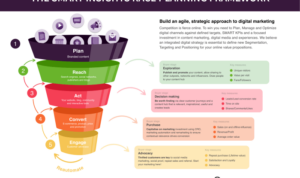Social Proof Strategies are a game-changer in marketing, influencing consumer behavior and building trust like never before. From testimonials to influencer endorsements, let’s dive into the world of leveraging social proof for business success.
Overview of Social Proof Strategies
Social proof is a psychological phenomenon where people assume the actions of others in an attempt to reflect correct behavior in a given situation. In marketing, social proof is crucial as it helps build credibility and trust with potential customers by showcasing that others have had positive experiences with a product or service.
Social proof strategies are specific tactics utilized by businesses to leverage the power of social proof in influencing consumer behavior. These strategies can range from customer testimonials and reviews to influencer endorsements and social media likes and shares.
Examples of Popular Social Proof Strategies
- Customer Testimonials: Displaying positive feedback from satisfied customers on a website or product page.
- Influencer Endorsements: Having well-known personalities or influencers promote a product or service to their followers.
- Social Media Likes and Shares: Showcasing the popularity of a product through the number of likes, shares, and comments on social media platforms.
Role of Social Proof in Building Credibility and Trust
Social proof plays a significant role in building credibility and trust with customers as it provides reassurance that a product or service is reliable and worth purchasing. By showcasing positive experiences and feedback from others, businesses can establish a sense of trust and authenticity, ultimately influencing consumer purchasing decisions.
Types of Social Proof: Social Proof Strategies

Social proof comes in various forms and can be a powerful tool for businesses to build credibility and trust with consumers. Let’s explore some of the most common types of social proof and how they can be leveraged effectively.
Testimonials
Testimonials are statements from satisfied customers endorsing a product or service. Businesses can showcase these testimonials on their websites, social media pages, and marketing materials to demonstrate the positive experiences of past clients. For example, a skincare company may feature testimonials from customers who have seen improvements in their skin after using their products.
User Reviews
User reviews provide feedback from customers who have purchased and used a product or service. Businesses can encourage customers to leave reviews on platforms like Yelp, Google, or Amazon to help prospective buyers make informed decisions. For instance, a restaurant may display positive reviews from diners praising the quality of the food and service.
Influencer Endorsements
Influencer endorsements involve partnering with social media influencers or celebrities to promote a brand or product. Businesses can reach a larger audience and gain credibility by having influencers endorse their offerings. For example, a clothing brand may collaborate with a popular fashion influencer to showcase their latest collection.
Social Media Likes
Social media likes indicate the popularity and engagement of a post or product on platforms like Instagram, Facebook, and Twitter. Businesses can use social media likes as a form of social proof to show that their content is resonating with their audience. For instance, an online retailer may highlight a product that has received thousands of likes to entice potential customers.Each type of social proof plays a crucial role in influencing consumer decision-making by building trust, credibility, and validation for businesses.
By strategically leveraging testimonials, user reviews, influencer endorsements, and social media likes, companies can establish a positive reputation and attract more customers.
Implementing Social Proof Strategies

To effectively implement social proof strategies, businesses need to follow a few key steps. It’s essential to collect and showcase social proof from customers, ensuring authenticity and transparency in the process. Incorporating social proof into marketing campaigns can greatly enhance credibility and trust with your audience.
Tips for Collecting and Showcasing Social Proof
- Encourage satisfied customers to leave reviews or testimonials on your website or social media platforms.
- Utilize user-generated content, such as photos or videos featuring your products or services, to showcase real-life experiences.
- Create case studies or success stories highlighting how your offerings have positively impacted customers.
- Showcase social media mentions, endorsements, or partnerships with influencers or industry experts.
The Importance of Authenticity and Transparency
Authenticity and transparency are crucial when using social proof. Customers can easily spot fake reviews or testimonials, which can damage your brand’s reputation. Always ensure that the social proof you showcase is genuine and accurately represents the experiences of your customers.
Best Practices for Incorporating Social Proof into Marketing Campaigns
- Place social proof prominently on your website, product pages, and marketing materials to build trust with potential customers.
- A/B test different types of social proof to see what resonates best with your audience and drives conversions.
- Utilize social proof in email marketing campaigns to provide social validation and encourage action from subscribers.
- Regularly monitor and update social proof to keep it relevant and reflective of your current customer base.
Measuring the Effectiveness of Social Proof
Businesses can measure the impact of social proof strategies on their marketing efforts by analyzing various key performance indicators (KPIs) that indicate the success of social proof campaigns.
Key Performance Indicators (KPIs)
Key performance indicators are essential metrics that help businesses assess the effectiveness of their social proof strategies. Some common KPIs include:
- Conversion Rate: This measures the percentage of website visitors who take a desired action after being influenced by social proof.
- Engagement Metrics: Tracking likes, shares, comments, and other forms of engagement can show how well social proof is resonating with the audience.
- Click-Through Rate (CTR): Monitoring the CTR of social proof elements can indicate how compelling they are in driving traffic.
Tools and Analytics for Tracking Effectiveness
Businesses can utilize various tools and analytics to track the effectiveness of their social proof strategies. Some examples include:
- Google Analytics: This tool can provide insights into website traffic, conversions, and user behavior influenced by social proof.
- Social Media Analytics: Platforms like Facebook Insights or Twitter Analytics offer data on engagement levels and reach of social proof posts.
- A/B Testing: Experimenting with different forms of social proof and measuring their impact can help optimize strategies for better results.
Case Studies of Measuring ROI, Social Proof Strategies
Several businesses have successfully measured the ROI of their social proof initiatives, showcasing the tangible benefits of these strategies. For example:
- Company X saw a 20% increase in conversions after implementing customer testimonials on their website, directly attributing the boost to social proof.
- Brand Y analyzed the impact of influencer endorsements on their sales and found a significant uptick in revenue, proving the effectiveness of social proof from influential figures.
- Startup Z tracked the engagement metrics of user-generated content and witnessed a surge in brand awareness and customer trust, leading to a positive ROI on their social proof efforts.

